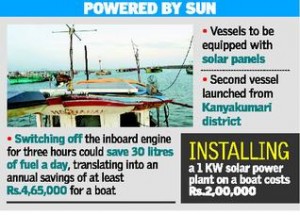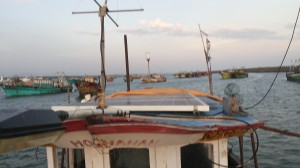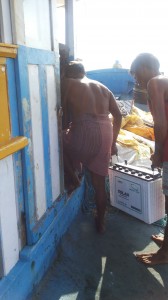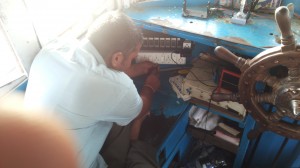The fishermen’s demand of not to permit any more foreign fishing vessels in India is overruled by the Committee headed by Dr. Meenakumari in the report entitled ‘Report of the Expert Committee Constituted for Comprehensive Review of the Deep Sea Fishing Policy and Guidelines’. This report recommended a fleet size of 1178 Deep Sea Fishing Vessels (DSFVs) for deployment in the Indian Exclusive Economic Zone (EEZ). This includes the existing DSFVs and the additional numbers of 270 vessels (240 tuna long liners, 15 purse seiners and 15 squid jiggers). The Committee also contended that the estimated marine resources in the EEZ are 4.41 metric ton.
The Committee under estimated the fishing capacity and expertise of the Indian fishermen. The contention of Committee is that Indian fishermen are not trained to work on DSFVs, and recommended for the engagement of foreign crew in onboard DSFVs with an annual salary of US $ 25,000; till the requisite skill is developed in the country. The versionn of the Committee is that India is presently lacking expertise to exploit resources in marine waters, beyond 500 meters. Hence technology transfer through acquisition of foreign fishing vessels and, or, joint ventures/leasing, etc. may be considered for this area till the domestic capacity is fully developed. The Thoothoor fishermen in the lower south-west coast of India are capable of fishing beyond 500 meter depth; as their normal fishing area is beyond 500 meter depth. They spend more than 35 days in the deep sea for fishing.
Another issue to be addressed is the ‘depletion of marine resources and need for sustainable fishing methods’. The sustainable fishing methods have been advocated by many agencies state, central, and international levels. This approach is targeted towards the sustainable livelihood fishermen, the marine resource dependent communities. If the conservation approaches in fishing is for the sake of fishermen, how can one consider the foreign fishing vessels that are detrimental to marine wealth? The foreign vessels can fish any species anywhere in India! The Ministry of Environment and Forests, conservationists are coming with the proposal of ban of sharks, ray fishes, etc. But in India we have 4.41 metric ton marine resources and among the resources what is the percentages of sharks and ray fishes?
In the above context, fishermen are very much distressed. With this backdrop, ADSGAF had a special executive meeting to discuss the two issues on 18 September 2014. Mr. Selvorian, the President of the ADSGAF chaired the meeting. The followings are the major decisions taken at the meeting.
- ADSGAF decided to prepare a Fishing Policy as an alternate to the one proposed by the Committee headed by Dr.Meenakumari titled ‘Review on Comprehensive Deep Sea Fishing Policy’; submitted to the Government of India. The responsibility for preparing the said policy is given to Mr. J.Vincent Jain, Chief Executive, ADSGAF. Time duration given for the completion of the report is 6 months. He has to consult fish workers representative, Scientists, fisheries experts, government officials, etc for the preparation of the report.
- ADSGAF also decided to join with the NFF for the national level protest against the controversial Deep Sea Fishing Policy and also give solidarity in connection with the above
- ADSGAF decided to give leadership to the move against the unscientific and impractical banning of fishing of sharks. ADSGAF decided to attend the National Consultation on Deep Sea Fishing Policy and Conservation of Sharks organized by NFF.
- ADSGAF decided to create awareness to the fishermen by exhibiting pictures of sharks and ray fishes which are put under the appendix II of CITES in the villages of Neerodi, Marthandanthurai. Vallavilai, Eraviputhenthurai, Chinnathurai, Thoothoor, Poothurai and Eraimanthurai with the support of HSI-India.
- ADSGAF decided to organize a special meeting at sea on 20 September 2014 by inviting visual Medias to demonstrate the methods of fishing by using nets, hooks and line etc.




